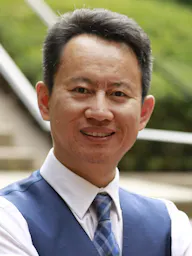
Xiaoming Zhai, Ph.D.
- Associate Professor
Department of Mathematics, Science, and Social Studies Education - Director
AI4STEM Education Center
Areas of Expertise
- Science education with a focus on physics
- Assessment and measurement theory
- Applied quantitative methods and data sciences in science education
- Technology integration theory in science education
Interests
- AI/Machine learning-based innovative assessment practices in science
- Learning progression
- Mobile learning in science
- Science teacher education and career motivation
Concentrations
Education
- Ph.D. in Curriculum and Instruction (physics), 2017
Beijing Normal University
Contact
Research Summary
I am an Associate Professor in Science Education and the Institute for Artificial Intelligence, Associate Professor in Computer Science (Coutesy) and Statistics (Coutesy), serving as the Directors of the National Center of Generative AI for Uplifting STEM+C Education (National GENIUS Center) and the AI4STEM Education Center (http://ai4stem.uga.edu), a cross-campus platform for faculty members in the Mary Frances Early College of Education, Franklin College of Arts and Sciences, and College of Engineering, aiming to foster interdisciplinary collaboration on using AI to advance STEM education. The AI4STEM Education Center explores the great potential of applying AI in STEM education through research and practice. With this mission, my research interests focus on two areas: (a) The first looks at using AI-based innovative assessment to examine complex constructs in science learning and teaching as one means of supporting teachers, approaching the topic through a variety of methodologies and technologies such as machine learning. (b) My second research area of interest concerns the application of AI in science teaching and learning, particularly in faciliating science and engineering practices. My research has broadly appeared in high-impact journals such as Journal of Research in Science Teaching, Studies in Science Education, International Journal of Science Education, Journal of Science Education and Technology, Research in Science Education, Computers& Education, Computers& Education: Artificial Intelligence, International Journal of Artificial Intelligence in Education, British Journal of Educational Technology, International Journal of Educational Research, Studies in Educational Evaluation, etc.
I served as the Guest Editor of seven journals in the field and on three journals’ Editorial Board: Journal of Research in Science Teaching, Journal of Science Education and Technology, and Disciplinary and Interdisciplinary Science Education Research. I edited the milestone book, Uses of Artificial Intelligence in STEM Education (2024, Oxford University Press).
I co-founded RAISE (i.e., Research in Artificial Intelligence-Involved Science Education) Research Interest Group of NARST, a global organization for improving science education through research, and am serving as the founding Chair. I am also Co-Chairing NARST Strand 1. Science Learning: Development of Student Understanding.
I chaired the 2022 International Conference of AI-based Assessment in STEM, Athens, Georgia.
I am accepting talented and dedicated doctoral students and visiting scholars who are interested in innovative assessment practices.
Grants
Publications
Awards and Accolades
University of Georgia, 2022
The Alexander von Humboldt Foundation, 2022
University of Georgia, 2022
University of Georgia, 2021
University of Georgia, 2021
National Academy of Education, 2021
American Educational Research Association, 2021
National Association of Research in Science Teaching, 2020